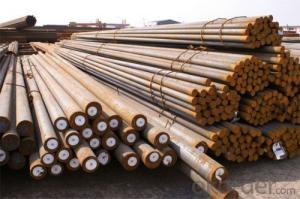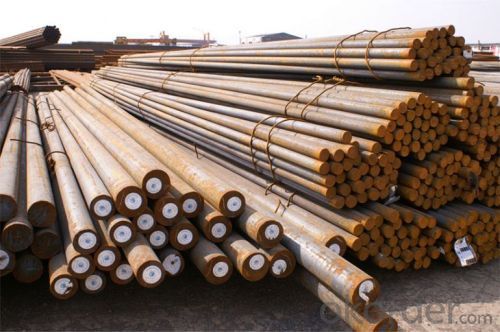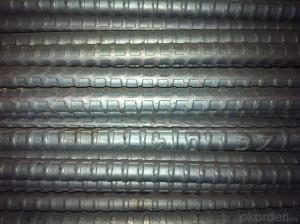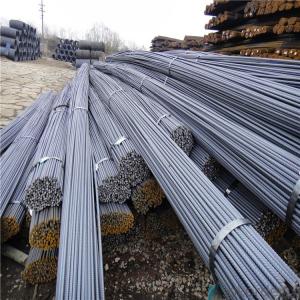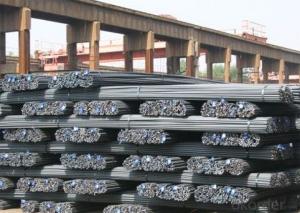Steel Rebar Dia 2mm -16mm Deformed Steel Bar
- Loading Port:
- China main port
- Payment Terms:
- TT OR LC
- Min Order Qty:
- 30 m.t.
- Supply Capability:
- 10000 m.t./month
OKorder Service Pledge
OKorder Financial Service
You Might Also Like
Specification
Steel Rebar Dia 2mm -16mm Deformed Steel Bar
Product Information:
Standard: ASTM, AISI, EN, DIN, JIS, GB
Diameter: 6mm-50mm
Length: 9m, 12m or as your requirement.
Technique: Hot rolled
| standard | GB | HRB335 HRB400 HRB400E HRB500 |
| USA | ASTM A615 GR40,GR60 | |
| UK | BS4449 GR460 | |
| Diameter in mm | 6,8,10, 12, 14, 16, 18, 20, 22, 25, 28, 32,40 | |
| Payment Terms | T/T or L/C | |
| Delivery Time | 15 to 30 days | |
| Usage | building and construction, | |
| residential building, office building, house, road, bridge, tunnel etc. | ||
Product Overviews:
| Product Name | Typical Grades | Diameter(mm) | Standard adopted |
| Carbon Steel | 20 (1020/S20C/C22) | Ø16-Ø300 | GB/SAE/JIS/DIN |
| 40 (1040/S40C/C40) | |||
| 45 (1045/S45C/C45) | |||
| Bearing Steel | GCr9 (51100/SUJ1) | Ø12-Ø250 | |
| GCr15 (52100/SUJ2/100Gr6) | |||
| GCr9SiMn (A485-Gr.1/SUJ3) | |||
| Cr-Mo Steel | 20Cr (5120/SCr420H/20Cr4) | Ø12-Ø250 | |
| 40Cr (5140/SCr440/41Cr4) | |||
| 42CrMo(4140/SCM440/42CrMo4) | |||
| Gear Steel | 20CrNiMo | Ø16-Ø600 | |
| 20CrMn(5115/SMnC420/20MnCr5) | |||
| 20CrNiMo(8620/SNCM220/20CrMiMo2) |
Product Show:

Our Advantages:
· Industry experience over 20 years.
· Shipment of goods -More than 70 countries worldwide.
· The most convenient transport and prompt delivery.
· Competitive price with best service.
· High technical production line with top quality products.
· High reputation based on best quality products.
With our experienced, enthusiastic and dynamic staffs, we assure to bring you the products with best quality, reasonable prices and good after-sales services under the motto: Friends First, Business After.
Communication, Experience, Expertise and Best efforts are our Promises to you.
- Q: How does special steel perform in high-stress environments?
- Special steel is designed specifically for high-stress environments, excelling in various forms of stress, including mechanical, thermal, and chemical stress. What sets it apart is its distinct composition and manufacturing process, resulting in exceptional resistance to stress. One of the standout features of special steel is its remarkable tensile strength. It can withstand immense pressure without deforming or failing. This strength is achieved by incorporating alloying elements like chromium, nickel, and molybdenum, which enhance its structural integrity and toughness. These elements also enhance the steel's resistance to corrosion and oxidation, ensuring its durability and reliability in harsh conditions. Additionally, special steel exhibits superb fatigue resistance, enabling it to endure repetitive and cyclic loading without developing cracks or fractures. This quality is crucial in high-stress environments where components are constantly subjected to vibrations or cyclic loading, such as in aerospace, automotive, and industrial applications. Not only does special steel possess impressive mechanical properties, but it also boasts exceptional resistance to extreme temperatures. It retains its strength and integrity even at elevated temperatures, making it suitable for use in high-temperature environments like power plants, furnaces, and chemical processing industries. Furthermore, special steel excels in wear resistance, enabling it to withstand abrasive conditions encountered in mining, construction, or manufacturing processes. This reduces the need for frequent maintenance or replacement, resulting in cost savings and increased productivity. In conclusion, special steel's outstanding performance in high-stress environments can be attributed to its unique combination of strength, durability, corrosion resistance, fatigue resistance, temperature resistance, and wear resistance. Its ability to withstand extreme conditions makes it the ideal choice for critical applications where reliability and safety are of utmost importance.
- Q: How is case-hardening steel used in the production of gears and shafts?
- Case-hardening steel is used in the production of gears and shafts to provide them with a hard outer layer, while maintaining a tough and durable core. The steel is heated and then subjected to a process known as carburizing, where it comes into contact with carbon-rich materials to absorb carbon into its surface. This process creates a high carbon concentration at the outer layer, resulting in increased hardness and wear resistance. The case-hardened gears and shafts offer superior durability, allowing them to withstand heavy loads and friction in various applications.
- Q: How is special steel used in the production of consumer goods?
- Special steel is used in the production of consumer goods due to its superior strength, durability, and corrosion resistance. It is commonly used in manufacturing appliances, cutlery, automotive components, and construction materials, ensuring the end-products meet high-quality standards and have a longer lifespan.
- Q: How does high-speed steel perform in high-temperature cutting operations?
- High-speed steel performs well in high-temperature cutting operations due to its exceptional heat resistance and ability to retain hardness at elevated temperatures. This enables it to maintain its cutting efficiency, withstand thermal stress, and resist deformation, resulting in improved tool life and productivity.
- Q: How does special steel contribute to improving product reliability?
- Special steel contributes to improving product reliability in several ways. Firstly, special steel is known for its exceptional strength and durability, making it less prone to wear and tear or structural failures. This enhanced strength ensures that products made with special steel can withstand heavy loads, extreme temperatures, and harsh working conditions, thereby increasing their reliability and lifespan. Additionally, special steel is often engineered to have superior resistance to corrosion, rust, and other forms of degradation, minimizing the risk of damage or malfunction due to environmental factors. Moreover, the precise composition and manufacturing processes used in special steel production enable tighter tolerances and improved dimensional accuracy, resulting in products that fit together more seamlessly and function with greater precision. Overall, the use of special steel in various industries helps to enhance product reliability, ensuring that customers can trust in the quality and performance of the end products they use.
- Q: Can special steel be used in the manufacturing of firearms?
- Yes, special steel can definitely be used in the manufacturing of firearms. In fact, special steel is often preferred for this purpose due to its unique properties that make it suitable for withstanding high temperatures, pressures, and stress. Firearms require materials that are strong, durable, and able to handle the intense forces generated during firing. Special steel alloys, such as stainless steel or heat-treated steel, offer these desired characteristics and are commonly used in the production of firearm barrels, receivers, and other critical components. The use of special steel in firearms manufacturing ensures that the weapons are reliable, safe, and able to perform consistently under various conditions.
- Q: Can special steel be used in the textile manufacturing industry?
- Yes, special steel can be used in the textile manufacturing industry. Special steel, such as stainless steel or high carbon steel, can be utilized in textile machinery parts, needles, or cutting tools due to their durability, corrosion resistance, and strength. These properties make special steel suitable for various processes involved in textile manufacturing, such as weaving, knitting, or cutting fabrics.
- Q: How does special steel contribute to the automotive aftermarket?
- The automotive aftermarket greatly benefits from the inclusion of special steel, as it aids in the advancement and enhancement of various automotive components. This top-notch steel is engineered specifically to possess remarkable strength, endurance, and resistance against wear and tear. One of the primary manners in which special steel contributes to the automotive aftermarket is through the production of performance parts. These parts are crafted to enhance the efficiency and performance of vehicles, catering to the desires and preferences of car enthusiasts. For instance, special steel is utilized in the production of exhaust systems, turbochargers, and intake manifolds, enabling an increase in horsepower and torque, as well as improved fuel efficiency. Furthermore, the production of suspension components, such as coil springs and sway bars, benefits from the usage of special steel. These components provide superior handling and stability, elevating the driving experience and ensuring the safety of both the vehicle and its occupants. Moreover, special steel is essential in the manufacturing of braking systems, encompassing rotors and brake calipers. These components are essential in achieving effective braking and maintaining control of the vehicle. By incorporating special steel, aftermarket brake systems can offer enhanced stopping power, reduced fade, and increased resistance to high temperatures. Additionally, special steel finds application in the production of engine components, including crankshafts, connecting rods, and valve springs. These components endure extreme forces and temperatures, and the exceptional strength and heat resistance of special steel enable them to withstand such conditions, resulting in improved engine performance and longevity. In conclusion, special steel significantly contributes to the automotive aftermarket by aiding in the development of high-performance parts, suspension components, braking systems, and engine components. Its outstanding strength, endurance, and resistance to wear and tear guarantee improved vehicle performance, efficiency, and overall driving experience.
- Q: What are the different methods of surface passivation for special steel?
- There are several methods of surface passivation for special steel, including chemical passivation, electrochemical passivation, and mechanical passivation. Chemical passivation involves treating the surface with chemicals to remove impurities and create a protective layer. Electrochemical passivation uses an electric current to form a passive oxide layer on the surface. Mechanical passivation involves physical processes such as polishing or shot peening to remove contaminants and improve surface quality. These methods help enhance the corrosion resistance and durability of special steel surfaces.
- Q: How does special steel contribute to the packaging industry?
- Special steel contributes to the packaging industry by providing high strength, durability, and corrosion resistance, making it ideal for manufacturing packaging materials and machinery. It ensures the integrity and safety of packaging products, prevents damage during transportation, and extends the shelf life of perishable goods. Additionally, special steel's versatility allows for innovative packaging designs and customization, meeting the specific requirements and demands of different industries.
Send your message to us
Steel Rebar Dia 2mm -16mm Deformed Steel Bar
- Loading Port:
- China main port
- Payment Terms:
- TT OR LC
- Min Order Qty:
- 30 m.t.
- Supply Capability:
- 10000 m.t./month
OKorder Service Pledge
OKorder Financial Service
Similar products
Hot products
Hot Searches
Related keywords
